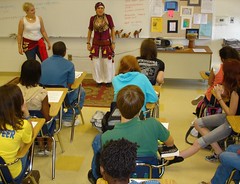
Jordan Mitchell and Kathy Fontaine teaching belly dance at cmhs, Shreveport
Originally uploaded by trudeau
As a large country separated from the rest of the world by two oceans, the U.S. has not had to concern itself as much with such fine points as knowing that Guinea is a country in Africa and that New Guinea is an island north of Australia.
Also, with English the dominant language of international business and culture, it's easier for Americans -- as well as Canadians and Britons, who also rank low in geographic knowledge -- to overlook the fact that the world is made of multiple cultures.
"We tend not to give as much importance to other cultures and languages as we might otherwise," Garcia said. "We don't travel outside our own country as much as people in other countries. We don't speak multiple languages as people in Europe commonly do."
In recent years, another factor has been the priorities of the No Child Left Behind Act, aimed at improving academic performance in U.S. schools. The law's testing requirements emphasize reading and mathematics. Although geography is listed as one of nine key subject areas in the law, it is the only subject that is not provided with teaching funds under the act.
"With No Child Left Behind, it's geography that's being left behind," said Kimberly Crews, executive director of the National Council for Geographic Education, a professional organization that works to improve the teaching of geography. "Especially in the last five or six years, we've witnessed a decline in the teaching of geography."
The council is lobbying Congress to pass pending legislation that would provide $15 million a year to fund college and university programs to train elementary and secondary instructors to teach geography, either as a stand-alone subject or as a topic that is woven into other subjects.
The article also points out people trying to make a difference in geographic learning. Swanson cites the GeographyZone.com. and MyWonderfulWorld.com.
He completes the story the way do at CMHS: with a mult-choice, open-notes quiz. Here 'tis:
How's your geography IQ?
Test your knowledge of the world with these five questions from the National Geographic bee. Hint: all of the countries are on the same continent.
1. This tiny city-state, located on one of the world's most strategic straits is one of the busiest ports in the world.
2. Israel captured the Golan Heights from this neighboring country in the Six-Day War in 1967.
3. Abu Dhabi and Dubai are states with significant oil reserves in this country.
4. The nations of Turkmenistan, Usbakistan and Tajikistan all border this landlocked country in the Hindu Kush Mountains.
5. Goa, which has been influenced by both Hindu and Roman Catholic traditions, is a state in this country.
- - -
Geo-answers
1. Singapore
2. Syria
3. United Arab Emirates
4. Afghanistan
5. India
Most of my students and readers should have gotten #2, 3, and 4, IMHO. With the new semester we'll have student Zoe Auld as a guest who knows about Goa because her mother's family resides there.

No comments:
Post a Comment